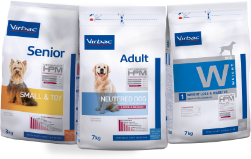
Veterinary HPM dog food for Puppy Growth
Growth is a key period for your puppy’s health
During their growth, puppies have very precise nutritional needs that have to be strictly fulfilled.
Puppy’s growth is very intense. On a 18 months period, large breeds puppy’s weight will be multiplied by 80. In comparison, a human’s weight is multiplied by 20 in 18 years.
At the same time, the puppy’s health is fragile. His immune system and digestive system are immature.
That’s why it is very important to choose a high quality complete and balanced diet for your puppy.
 Be vigilant : any nutritional mistake could threaten your puppy’s future adult health!
Be vigilant : any nutritional mistake could threaten your puppy’s future adult health!Vegetarian diets, as well as raw meat diets, are unadvisable for puppies.
NUTRITION PLAYS A KEY ROLE DURING THE GROWTH PERIOD
GOOD NUTRIENTS IN APPROPRIATE QUANTITY
Apart from your love and care, your puppy needs a precise balance of specific nutrients to grow well.
-
High quality Proteins to ensure the growth of bones, muscles, skin and coat, and support immunity.
-
Reduced level of Carbohydrates (starch), as his still immature digestive system is not able to assimilate them properly.
-
A balanced supply of Minerals to build a healthy bone structure.
-
Essential Fatty Acids (DHA) to support cognitive development.
ADAPTING NUTRITION TO THEIR BREED FORMATS, ALL ALONG
Small breeds have a very short and intense growth ending at 10 months. Their nutrition should be adapted to those
intense needs.
Medium and large breeds have a long growth, up to 18 months. They are exposed to osteoarticular troubles if the mineral balance is not appropriate, or in case of excessively quick growth or excessive weight gain.
That’s why different diets, formulated in accordance with their needs, are necessary to cover growth before and after the growth peak. The growth peak is the moment that separates the 2 phases of growth. During the first phase, growth is intense and quick, during the second phase, growth slows down.
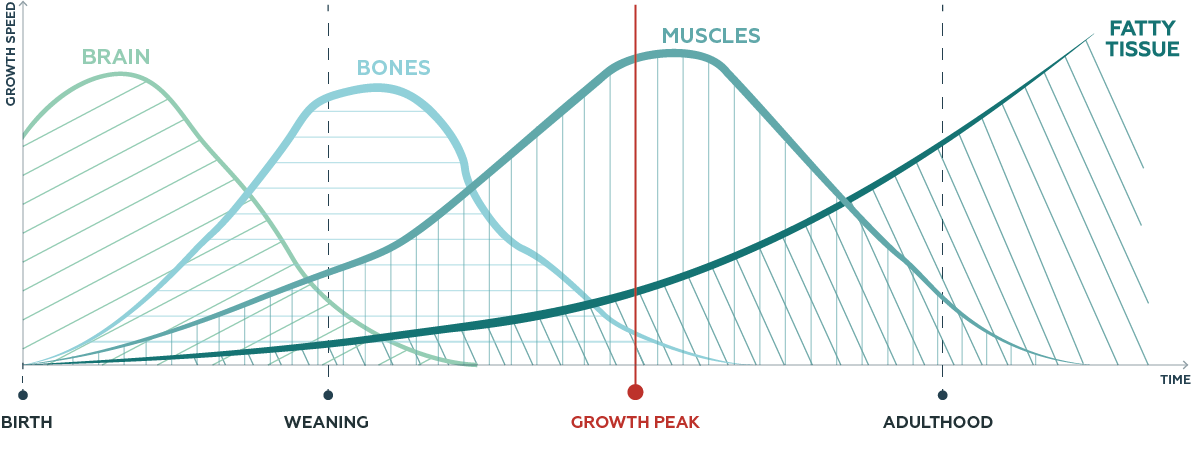
.png) In order to protect the puppy’s health and prevent early obesity development, a close attention must be paid to his growth curve.
In order to protect the puppy’s health and prevent early obesity development, a close attention must be paid to his growth curve.
Weigh your puppy every 2 weeks and follow his weight curve.
With VETERINARY HPM® growth program, give them the best start in life
Our nutritional program is specially designed to match your puppy’s needs all along growth, from weaning to adulthood, before and after the growth peak.
All our diets are made with high quality ingredients and follow Low carbohydrate High Protein concept of formulation, thus ensuring the respect of your puppy’s nature as carnivore.
BABY FOR THE INTENSE NEED OF THE 1ST PART OF GROWTH
At weaning, start with VETERINARY HPM ® Baby dog, which is specifically formulated to cover the intense needs of the 1st part of growth. Our Baby dog diets provide high energy and digestibility. Thanks to their special formulation, they activate immunity, promote digestive tolerance and the development of strong bones:
-
Highly Energetic and Highly Digestible, to cover their intense needs through small rations.
-
High level of highly Digestible Proteins, 90% of animal origin , to support the development of muscles and bones. Proteins associated with Betaglucans also support immunity.
-
Reduced level of Carbohydrates (Starch) combined with added lactobacilli and bentonite allow to cope with their immature digestive system and reinforce digestive comfort.
-
Balanced Minerals (Calcium and Phosphorus) to ensure healthy bone development.
-
High quantities of Essential Fatty Acids (DHA) to support brain and cognitive development.
According to the breed format of your puppy, choose Baby dog S&T or Baby dog L&M.
JUNIOR, AFTER THE GROWTH PEAK (MEDIUM AND LARGE BREEDS ONLY)
After the growth peak, and until the end of his growth, use our VETERINARY HPM ® Junior Dog diets.
VETERINARY HPM ® Junior Dog diets are specifically adapted to the second phase of growth on long growth breed, when the growth pace slows down after the growth peak. They promote muscle development and limit the risk of excessive weight gain and musculoskeletal issues.
-
Moderate Energy density avoids a too quick growth, excessive weight gain and osteoarticular troubles.
-
High level of Highly Digestible animal origin Proteins, to ensure the development of healthy muscles.
-
Reduced level of Carbohydrates (Starch), Prebiotics and Probiotics promote high digestive tolerance.
Do's and Don'ts
 Weigh your puppy every 2 weeks and follow his weight curve.
Weigh your puppy every 2 weeks and follow his weight curve.
 Regularly check and adapt the ration according to your puppy’s weight. If you have any difficulties or questions, contact your veterinary clinic.
Regularly check and adapt the ration according to your puppy’s weight. If you have any difficulties or questions, contact your veterinary clinic.
 Strictly follow the daily ration advised. Offering food free choice, excessive daily rations or above caloric needs, especially when a diet has a high fat content, favors the development of obesity and osteoarticular disorders.
Strictly follow the daily ration advised. Offering food free choice, excessive daily rations or above caloric needs, especially when a diet has a high fat content, favors the development of obesity and osteoarticular disorders.
 Raw meat (Barf) or vegetarian diets are strictly inadvisable for puppys. Such diets can cause major nutritional deficiencies with serious consequences on health.
Raw meat (Barf) or vegetarian diets are strictly inadvisable for puppys. Such diets can cause major nutritional deficiencies with serious consequences on health.
 Do not give leftover food that is too fatty, salty or sweet.
Do not give leftover food that is too fatty, salty or sweet.
 Do not add mineral and vitamin supplements.
Do not add mineral and vitamin supplements.
 Don’t feed your puppy with an Adult dog food.
Don’t feed your puppy with an Adult dog food.
- Can I feed my puppy with a home-made diet?
The food that puppies receive throughout their first year must obviously provide energy and materials to build the skeleton, muscles, and all new tissues. But nutrition does not stop there, it must also help puppies develop a fully functioning nervous system and effective immune system. Any deficiency in essential nutrients (those which cannot be synthesized by the animal's body) during this very delicate period may affect the dog's future health.
Many recipes developed by veterinary nutritionists are available for owners who wish to prepare a nutritionally balanced home-made diet for their puppy dog food needs. However, it is illusory to succeed in respecting all the required conditions because the nutritional balance of a household ration is subject to various hazards. The owner will always find it difficult to follow the recipe exactly, the necessary ingredients are not always available, and the nutritional composition of the ingredients can vary considerably depending on the origin of the product. When preparing a home-made diet, no laboratory analysis can verify the nutritional composition of the raw materials used!
Therefore, even when accompanied by the distribution of a mineral and vitamin supplement, home-made diets for dogs often show deficiencies in some essential nutrients. For a safer and more balanced alternative, consider feeding your pet a high protein food for puppies designed to support proper development. Commercially prepared dry puppy food options are often the best puppy dog food choices for consistency and reliability.
- How can I see if my puppy grows well?
In order to protect the puppy’s health and to prevent early obesity development, a close attention must be paid to the growth curve. More information
To control the puppy’s rate of growth, it is important to carefully monitor his weight curve (page à venir ultérieurement) especially during the most rapid growth period. Weighing your puppy every 2 weeks is the best way to control the situation.
![growth_dog_infographic.png]()
If a large breed puppy becomes too heavy to be picked up on the scale, don’t hesitate to go and weigh the puppy at a veterinary clinic equipped with a platform scale available to clients.
Each time the puppy’s BW is measured, it will be noted on a growth chart. Veterinarians and breed clubs can provide typical curves for different breeds; these references will help you to evaluate your puppy's growth. Your veterinarian can also help you interpret your puppy's growth curve. For example, if the puppy is gaining weight too fast, your vet can adjust the daily feeding ration or advise a new diet that respects the growth requirements while limiting the caloric intake.
- Can I feed my puppy with raw meat diets?
Raw meat diets (red meat or chicken) are often deficient in calcium and phosphorus. The Calcium/Phosphorus ratio is totally inappropriate for the canine species, especially in terms of bone growth. Such a diet can cause major nutritional deficiencies with serious consequences on health. For example, when fed exclusively a raw meat diet, the puppy is exposed to the risk of pathologic fractures following minor trauma.
To avoid these risks, it is advisable to feed your pup a scientifically balanced dry puppy food. These formulas are designed as high protein food for puppies and are considered by many veterinarians as the best puppy dog food to ensure long-term health and development.
- Can I feed my puppy with a vegetarian diet?
The dog is a carnivore, which means that certain nutrients it needs cannot be provided by a plant-based diet. Such diets can cause major nutritional deficiencies with serious consequences on health. For this reason, a puppy should never be fed a vegetarian diet. Instead, opt for puppy dog food that meets its natural dietary requirements—particularly high protein food for puppies in a dry puppy food form that is considered among the best puppy dog food options.
- Will my puppy like his new diet?
Our diet is very palatable and most puppys love it. It is prepared with ingredients that dogs naturally like. At weaning, your puppy will have to get used to kibbles in replacement of her mother’s milk. That’s why you should gradually introduce kibbles.
- How do I change the diet of my puppy from my current diet to the new VETERINARY HPM ® growth program?
At weaning, your puppy must progressively get used to solid food instead of mother’s milk. You can add some warm water to the kibbles at the beginning.
If you change from another dry food to VETERINARY HPM ®, to help your puppy's digestive system adapt successfully to the new food, we recommend that you introduce VETERINARY HPM® gradually over a period of 5 to 7 days
![diet_infographic.png]()
- How many meals should I give to my puppy every day?
We recommend dividing your puppy’s daily ration into 3 meals a day until he is at least 6 months old. Then, you can reduce to 2 meals per day.
As your puppy grows, it is important to gradually transition to adult dog food. Choosing the best adult dog food, especially a dry adult dog food that is also a high protein adult dog food, will ensure your dog maintains optimal health and muscle mass throughout adulthood.
- How to organize your puppy’s meals?
His feeding area should be quiet and clean.
- Provide two bowls, one for water and one for food.
- Choose unbreakable, odourless containers.
- Keep water available at all times, clean and fresh.
When it’s time to switch to adult dog food, make sure you select a dry adult dog food that supports your dog’s needs. A high protein adult dog food is considered the best adult dog food to promote sustained energy and well-being.
- What quantity of kibbles does my puppy need?
VETERINARY HPM® is very palatable, but we do advise that you respect the daily rations recommended by your vet or vet nurse. Our general feeding guidelines can be found on every bag, but your vet or vet nurse can provide you with a recommendation tailored specifically to your puppy.


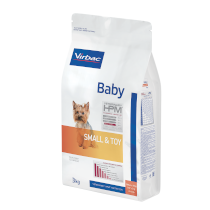
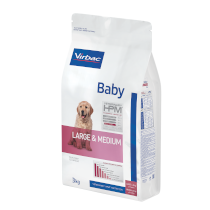
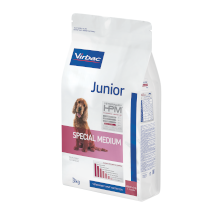
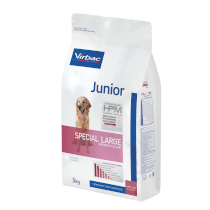


.png)
.png)
.png)
.png)

